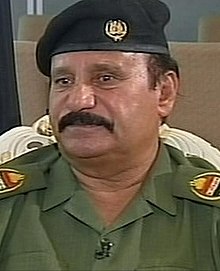Prime minister of Iraq from 1991 to 1993
- 1 2 "Former Iraq PM dies in US custody". BBC. December 6, 2005. Archived from the original on 2021-04-11. Retrieved January 12, 2024.
Mohammed Hamza az-Zubeidi | |
|---|---|
محمد حمزة الزبيدي | |
 Zubeidi in the 1990s | |
| Prime Minister of Iraq | |
| In office September 16, 1991 –September 5, 1993 |
| Political offices | ||
|---|---|---|
| Preceded by | Prime Minister of Iraq 1991–1993 | Succeeded by |
| Mandatory Iraq (1920–1932) | |
|---|---|
| Kingdom of Iraq (1932–1958) | |
| Iraqi Republic (1958–1968) | |
| Ba'athist Iraq (1968–2003) | |
| Iraqi Governing Council (2003–2004) | |
| Republic of Iraq (since 2004) | |
| |
| In playing cards |
| ||||||||
|---|---|---|---|---|---|---|---|---|---|
| Others | |||||||||
| | This article about an Iraqi politician is a stub. You can help Wikipedia by expanding it. |
